Mr. Pasan Dissanayake and Dr. Prathapasinghe Dharmawansa of ENTC have Published Two Research Papers in the Prestigious Journal IEEE Transactions on Information Theory
Two research papers written by Mr. Pasan Dissanayake and Dr. Prathapasinghe Dharmawansa of ENTC have been published in the prestigious journal IEEE Transactions on Information Theory. IEEE Transactions on Information Theory is the world’s No. 1 journal in the areas of Information and Communication theory research. This truly exceptional achievement will make the research history of ENTC. This extraordinary academic achievement will be a guiding spirit for the current and future researchers in the entire university system of Sri Lanka. Moreover, it will help place ENTC among the top researchers in information and communication theory in the world. The details of the two papers are as follows.
1. Distribution of the Scaled Condition Number of Single-spiked Complex Wishart Matrices
This paper statistically characterizes the scaled condition number (SCN) of single-spiked complex Wishart matrices by deriving its density function. The statistical characteristics of the SCN and its variants have been instrumental in understanding many physical phenomena across a heterogeneous field of sciences. While numerical analysts and statistical physicists are interested in the behavior of the SCN for white Wishart matrices, the case corresponding to correlated Wishart matrices are of paramount importance in wireless communications and statistics. In particular, the SCN has been used as a performance metric in certain wireless signal processing applications involving multiple-input multiple-output (MIMO) systems, in which the antenna correlation gives rise to the correlated Wishart matrix. Recently, the SCN has been proposed as one of the test statistics for blind spectrum sensing in cognitive radio (CR) systems. The key concept behind CR is to opportunistically utilize the underutilized spectrum in view of improving the spectral efficiency of modern wireless networks. Against this backdrop, this paper leverages powerful random matrix theoretic techniques and the novel density of the SCN to statistically characterize the receiver operating characteristics (i.e., ROC) of the aforementioned detector. Since the modern wireless architectures facilitate the use of large antenna/sensor arrays with comparable observational sample acquisition, the analysis has been extended to the asymptotic regime in which the number of antennas of the detector and the samples diverge at the same rate so that their ratio remains constant. It turns out that, in this asymptotic regime, the statistical power of the SCN based detector can be approximated by the most celebrated Tracy-Widom distribution corresponding to the complex matrices. Moreover, numerical results have revealed that those asymptotic results compare favourably with their not so large dimensional counterparts.
2. The Eigenvectors of Single-spiked Complex Wishart Matrices: Finite and Asymptotic Analyses
This paper investigates the finite dimensional distributions of the eigenvectors corresponding to the extreme eigenvalues (i.e., the minimum and the maximum) of single-spiked complex Wishart matrices. These spikes arise in various practical settings in different scientific disciplines. For instance, they correspond to the first few dominant factors in factor models arising in financial economics, the number of clusters in gene expression data, and the number of signals in detection and estimation theory. In particular, the focus is on the distributions of the squared modulus of the eigen-projectors (i.e., projection of the spiked-vector onto the leading and least eigenvectors) of single-spiked Wishart matrices. This metric is commonly used to infer information about the latent spiked-vector using the eigenvectors of the sample covariance matrix. A concrete example in this respect is the principal component analysis (PCA) in which the eigenvectors of the unknown population covariance matrix is approximated by the eigenvectors of the sample covariance matrix. This metric has further been used in the covariance estimation based on the optimal shrinkage of the eigenvalues of the sample covariance matrix in the high dimensional setting when the unobserved population covariance matrix assumes the spiked structure. This paper leverages the powerful contour integral representation of unitary integrals and orthogonal polynomial techniques to derive closed-form expressions for the densities of the above metrics. A somewhat surprising stochastic convergence result pertaining to the above metrics has also been established. Finally, the same analytical framework has been extended to derive the corresponding destines for real and singular Wishart scenarios; however, with closed-form solutions limited to a few special configurations only.
Team University of Moratuwa Selected as Finalists in the IEEE International Future Energy Challenge 2022
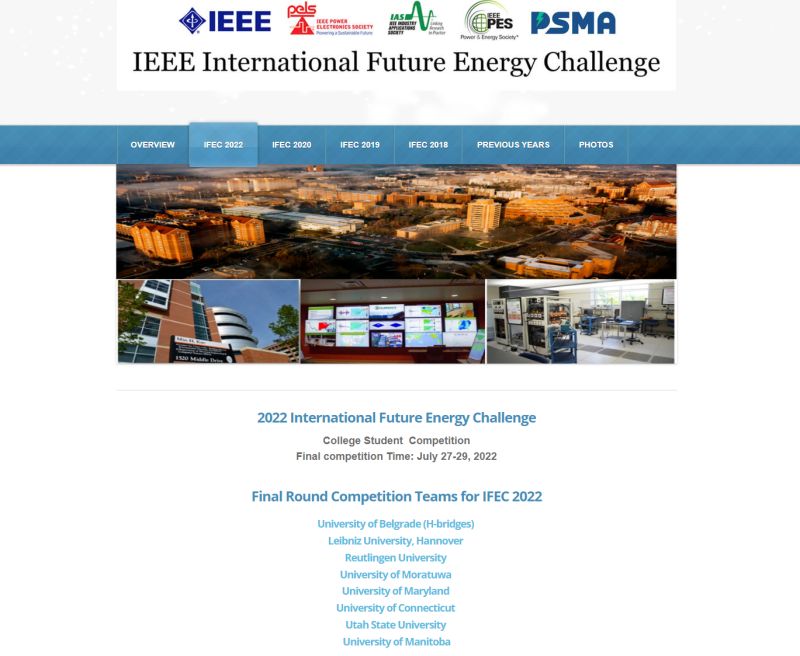
A team of undergraduates from the Dept. of Electronic and Telecommunication Engineering and Dept. of Electrical Engineering at the University of Moratuwa has been selected for the Grand Finals of the IEEE International Future Energy Challenge 2022 for the first time in Sri Lanka. This is a prestigious power electronics competition organized by the Institute of Electrical and Electronics Engineers (IEEE) and sponsored by the IEEE Power Electronics Society, IEEE Industry Application Society, IEEE Power and Energy Society and Power Source Manufacturers’ Association.
The team advisors:
Prof. Udayanga Hemapala – Head Department of Electrical Engineering
Dr. Subdoha Charles – Senior Lecturer at the Department of Electronic and Telecommunication Engineering
Mr. Thilina Ambagahawaththa – Lecturer at the Department of Electronic and Telecommunication Engineering
Mr. Iresh Jayawardana – Graduate of the Department of Electronic and Telecommunication Engineering
The team members from the Department of Electronic and Telecommunication Engineering:
Pahan Mendis – Team Leader
Pamuditha Somarathne
Punsara Mahawela
Ransara Wijitharathna
Dineth Mudalige
Chathuni Wijegunawardana
Hiruni Wijewardena
Nikeshi Kumarasinghe
Limalka Sadith
Supun Kuruppu
Biyon Fernando
The team members from the Department of Electrical Engineering:
Nawanjana Yesith
Geshan Sudasinghe
For this competition, the team designed a smart efficient and light microgrid inverter that converts DC power from a solar panel into AC. Since 2010, solar costs have declined 70% to 80% in the world, making solar one of the most economical ways for energy generation. However, integrating renewable and distributed energy resources, such as photovoltaics (PV) and energy storage devices, into the electrical applications requires advanced power electronics, or smart inverters, that provide efficient and reliable power management. The team target to achieve an efficiency greater than 95% and a bulk manufacturing cost less than $200 in their inverter.
The team progressed through the initial selection round where they submitted their proposal for the inverter that caters the set of given specifications. During the semi-final round, 13 teams from prestigious universities in the world demonstrated their hardware design of the proposed inverter. Our team from University of Moratuwa, along with 7 other teams from Europe, Canada, and America, have been selected for the grand finals based on the technical quality of the design and the progress of hardware implementation demonstrated in the semi-final round. The final competition will be held between 27th-29th of July 2022 at University of Tennessee, Knoxville, USA.
The complete hardware prototype of the inverter will be tested for its performance in front of judges and industry experts at the grand finals. A group of students representing the Team UoM is planning to visit the USA with the designed inverter for this final competition.
Read MoreInnovateFPGA Design Contest 21/22. Asia Pacific and Japan Region – Gold Award for Team AP116 from University of Moratuwa
Our team, AP116, comprised of Pahan Mendis, Chathuni Wijegunawardana and Pamuditha Somarathne from the Department of Electronics and Telecommunication Engineering at University of Moratuwa has won the Asia Pacific and Japan Regional Gold Award at the InnovateFPGA Design Contest 21/22. We convey our gratitude to our valuable advisors, Dr.Ajith Pasqual, Mr.Abarajithan Gnaneswaran and Mr.Kithmin Wickremasinghe.
InnovateFPGA Design Contest is a competition organized by Terasic Inc. in collaboration with the Intel Corporation, Microsoft, Analog Devices, Inc., Arrow Electronics Inc., Macnica Inc., Mouser Electronics, Inc., and Digi-key Electronics. We have been invited to the Grand Finals in Intel Innovation Campus in San Jose, California where the top 12 teams from four regions in the world will present their projects.
This year, the contest focused on exploring solutions that reduces environmental impact and the demand that we place on the planet’s resources. To address this objective, our team brought forth a concept of the Green Machine, a smart, user-friendly, domestic mini-greenhouse system to enable users to grow and efficiently monitor and tend to plants with much ease. This was designed for domestic user to grow their own food in their homes. Also, due its modular design, the farmers can combine multiple units of Green Machines for cultivation in small to large scale farms. The condition within the Green Machine is monitored using a set of sensors and cameras and the sensor and image data is sent to the Terasic DE-10 Nano, a development kit based on Intel CycloneV FPGA, for processing.
The Cyclone® V SoC FPGA HPS consists of a dual-core ARM Cortex-A9 MP Core processor and a rich set of peripherals, which gives the flexibility of programmable logic as well as the functionality of a processor (HPS). Our design makes use of the FPGA as well as the HPS optimally for acceleration and controlling.
The DE-10 Nano processes the obtained data to control the irrigation, ventilation and light needed for the plants for optimal growth and yield using a controller implemented on the Hard Processor System. Furthermore, a convolutional neural network is implemented on the DE-10 Nano to detect abnormalities in the plants. The FPGA portion was used for acceleration and was programmed using OpenCL Language.
After the processing, the sensor and image data are transferred to a Cosmos Database System on Microsoft Azure to be analyzed for further optimizations.
Through our project, we mainly focus on achieving two sustainable development goals.
Goal 2: Zero Hunger
Goal 12: Responsible Consumption and production.
Since the Green Machine is automated, it can be used by anyone. As it is optimized, the food productivity is higher, labor costs are lower, and resources are saved. So, the food can be produced at a lower cost.
As the plants are grown within a controlled environment, the need of pesticides is eliminated. Therefore, the safety and quality of food is ensured which provides significant health benefits. Because of the design aesthetics, the users can gain relaxation and satisfaction. Altogether, our Green Machine is just the first step of creating a vast eco-system that empowers sustainable agriculture.
The project video: https://www.youtube.com/watch?v=kD0ctF4-nac
The project link: https://www.innovatefpga.com/cgi-bin/innovate/teams.pl?Id=AP116&All=1
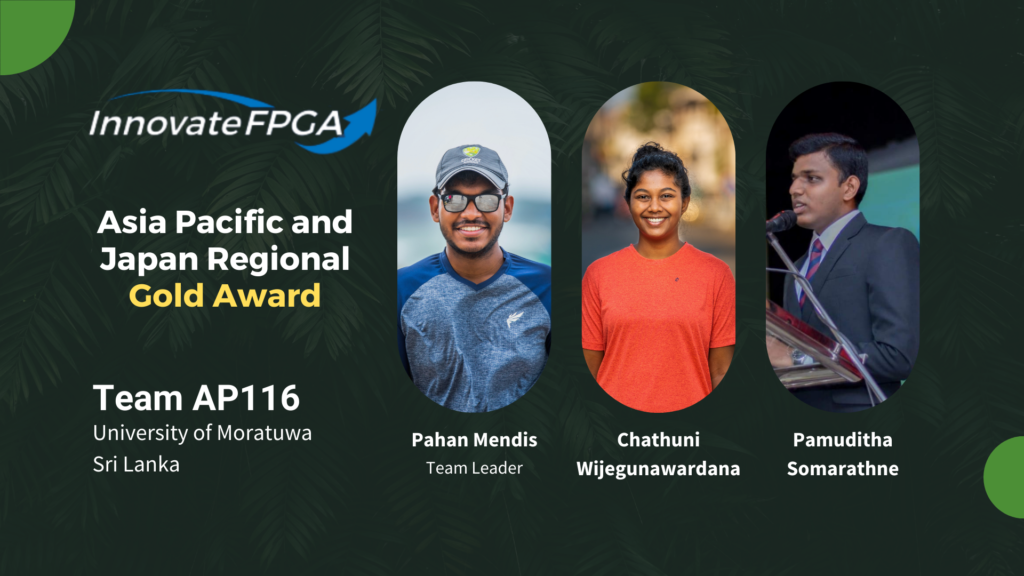
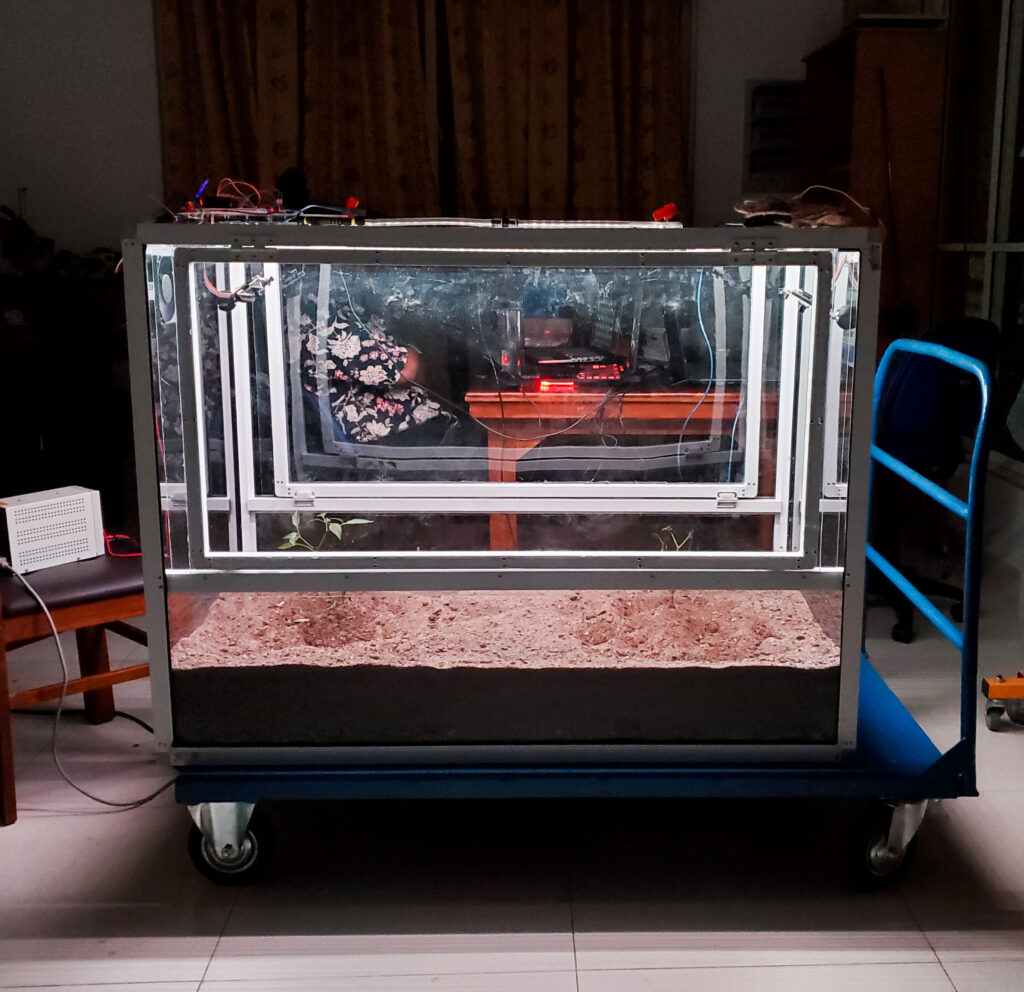
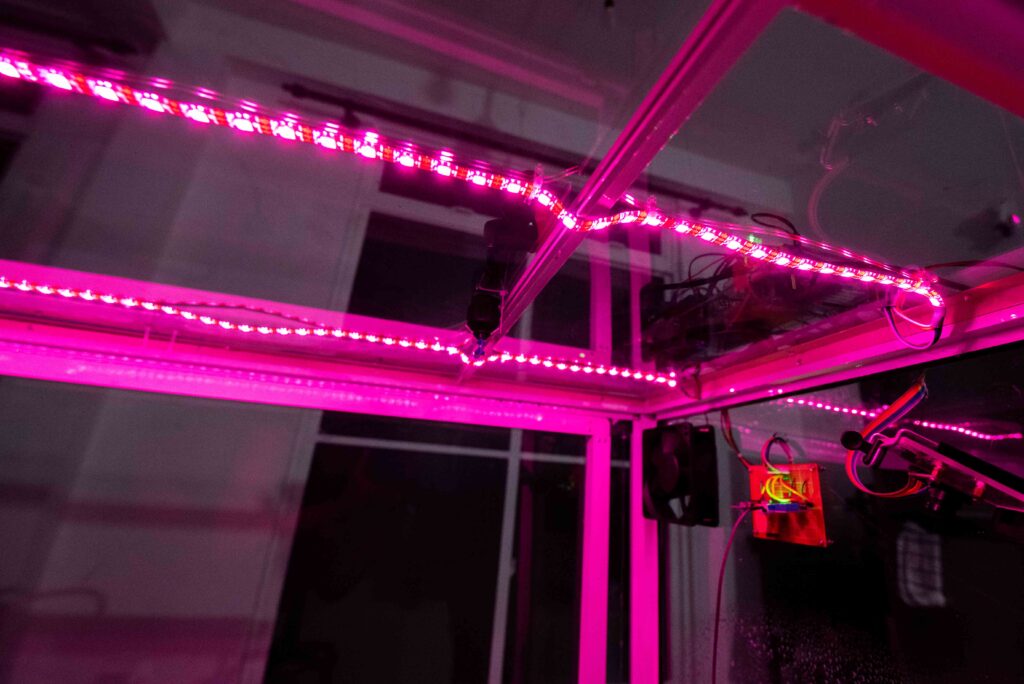
Step into ENTC
A session termed “Step into ENTC” was held on March 7, 2022, to educate the prospective students on the career opportunities and higher studies. The panel of lecturers, alumni, and final-year undergraduates conducted the session.
Mr. Mohamed Afham an alumnus now with Meta, NY, discussed about the path and opportunities in machine vision and machine learning. Mr. Deepana Ishtaweera with his background on robotics, robotic education, and start-ups talked about robotics. Mr. Jathurshan Pradeepkumar, a biomedical engineering alumnus now with Harvard, shed light on opportunities in biomedical engineering. Mr. Kalana De Silva, an alumnus attached to a large-scale telecommunication organization in Singapore, spoke about processor design. Dr. Subodha Charles, a staff member with expertise in cybersecurity and embedded systems, spoke about internet of things.
The panel showed a multitude of avenues to take in becoming an engineering scientist. The session turned out to be much informative to the participants.
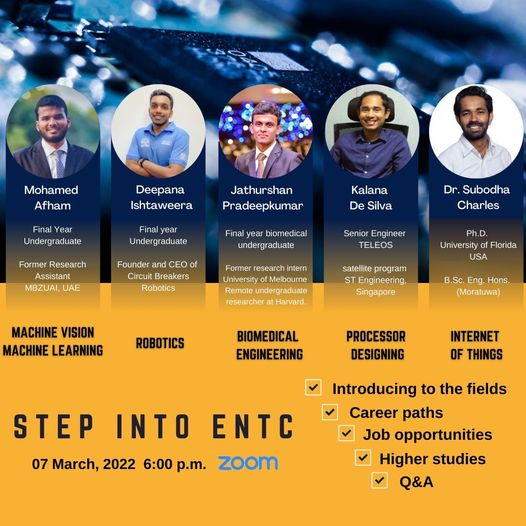
Second-place Winner of the ComSoc “Internet for All” Competition in the Asia Pacific Region
Sandushan Ranaweera, and undergraduate of ENTC has emerged as the second-place winner in the Asia Pacific Region in the Internet for All Competition organized by IEEE Communications Society which is one of the world premier associations for communication engineers.
In this competition the participating teams or individuals are required to submit a proposal outlining a plan to bring internet connectivity to an identified locality where a clear need of internet connectivity exists. The proposals should explain how if implemented the performance of the infrastructure will be measured, detect technical failures, risk mitigation plan and how the infrastructure will be maintained after the project duration.
Teams or individuals from worldwide were open to submit proposals. Winners were selected region-wise from Europe, Middle East and Africa Region, North America Region, Latin America Region and Asia Pacific Region. The jury picked First, Second, Third place winners with up to 5 honorable mentions per each region. Sandushan Ranaweera’s proposal which won the second place in Asia Pacific Region was outlined a project to give internet connectivity for underprivileged students in rural villages of Sri Lanka using existing common infrastructure.
The constant motivation and guidance of Dr. Tharaka Samarasinghe as the staff advisor of the IEEE Communications Society Student Branch Chapter should be appreciated here since he always encourages students to participate in these competitions. This achievement will uplift the brand name of ENTC and UoM while showcasing the practical industrial knowledge of ENTC undergraduates in international level.
Read MoreNBQSA 2021 Results
The final year project titled “Object Detection, Tracking and Suspicious Activity Recognition for Maritime Surveillance using Thermal Vision” received the Bronze award for Tertiary Students – Technology category at National ICT Awards NBQSA 2021.
NBQSA, The National ICT Awards Ceremony, provides recognition to outstanding achievements of individuals and organizations in Sri Lanka who have developed high quality ICT products and Tertiary Category – Technology targets the best quality work done by undergraduates in terms of research related to technical solutions.
The award was given for the technological solution provided when it comes to maritime surveillance in Sri Lankan borders and due to the amount of research work carried out during the project which includes a novel approach to Online Real-time Spatio Temporal Action Localization.
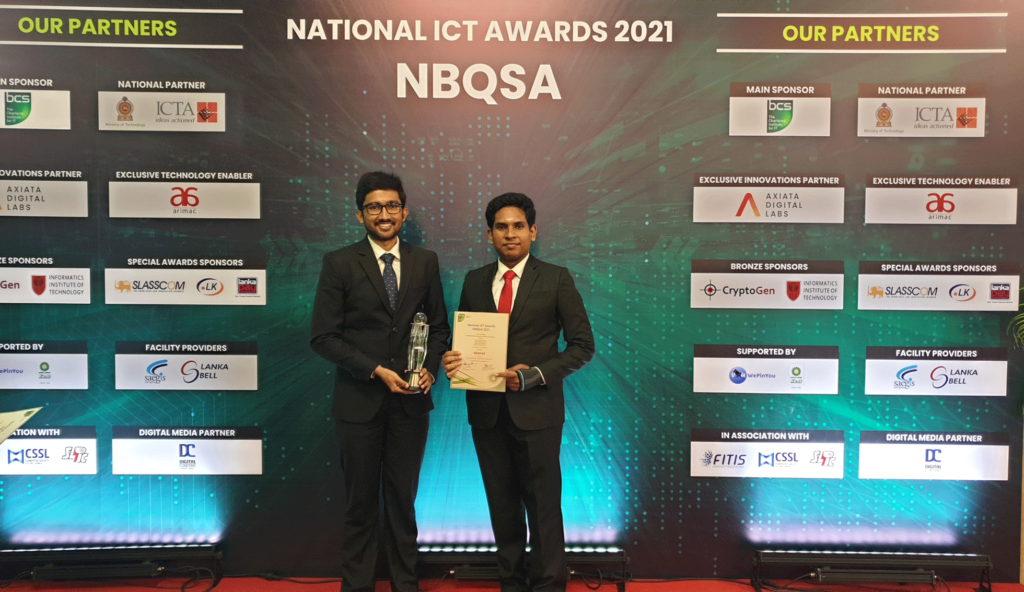

Dr. Ajith A. Pasqual Gets Elected as the President of the Sri Lanka Electronic Manufacturers and Exporters Association
Dr. Ajith A. Pasqual, a senior lecturer at the Department of Electronic and Telecommunication Engineering of the University of Moratuwa, has been elected as the president of the Sri Lanka Electronic Manufacturers and Exporters Association (SLEMEA). The aim of the association is to uplift Sri Lanka’s electronic manufacturing industry to boost the economic contribution through electronic exports. Dr. Pasqual will use his knowledge and experience in academia and industry to shoulder this task and bring about impactful changes in Sri Lanka’s the electronic manufacturing and export industry.
Read MoreB.Sc. Engineering Honours Degree in Electronic and Telecommunication Engineering Receives Full Accreditation
In response to the application for reaccreditation submitted to the Institution of Engineers, Sri Lanka (IESL), the B.Sc. Engineering Honours Degree in Electronic and Telecommunication Engineering of the Department of Electronic and Telecommunication Engineering of the University of Moratuwa has been granted full accreditation for the intake till 2023.
According to the IESL’s official website, “[IESL] being a signatory to the Washington Accord, the four-year full-time engineering degree programmes accredited by the IESL will be considered as substantially equivalent to four-year engineering degree programmes that have been accredited by the other signatories to the Washington Accord. A signatory to the Washington Accord is empowered by the Accord to accredit only those degree programmes conducted within the jurisdiction (country) of the signatory.”
https://iesl.lk/index.php?option=com_content&view=article&id=126&Itemid=170&lang=en
More information on the Washington Accord: https://www.ieagreements.org/accords/washington/
Read MoreResearch paper acceptance at IEEE/CVF WACV 2022
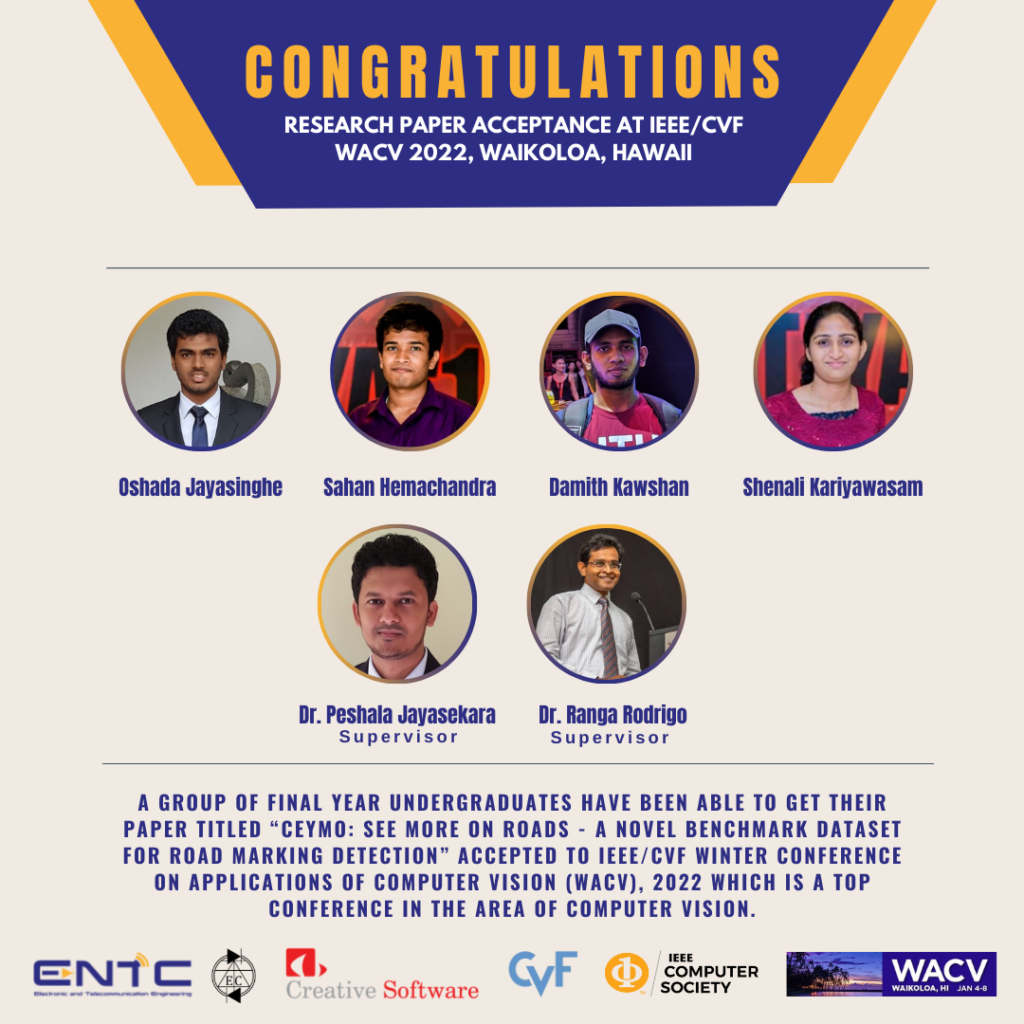
A research paper titled “CeyMo: See More on Roads – A Novel Benchmark Dataset for Road Marking Detection” has been accepted to the IEEE/CVF Winter Conference on Applications of Computer Vision (WACV), 2022. The research was conducted by Oshada Jayasinghe, Sahan Hemachandra, Damith Anhettigama, and Shenali Kariyawasam under the supervision of Dr. Peshala Jayasekara and Dr. Ranga Rodrigo.
The paper introduces a novel road marking benchmark dataset for road marking detection in advanced driver assistance systems and autonomous vehicles. Though understanding road markings is a fundamental perception task in autonomous vehicles, the development of robust road marking detection algorithms has been a challenging task in the research community due to diverse road, illumination, and traffic scenarios. The introduced dataset covers a wide variety of urban, sub-urban, and rural road scenarios with diverse illumination and weather conditions. The multiple annotation formats and the clear evaluation metrics with the evaluation script will promote novel road marking detection algorithms and direct comparison of them. Furthermore, the authors evaluate the approaches of utilizing instance segmentation-based and object detection-based neural network architectures for the road marking detection task, which will facilitate future research on road marking detection in challenging environments.
WACV is a top international conference in the field of computer vision and pattern recognition organized annually by the IEEE Computer Society and the Computer Vision Foundation. WACV 2022 will be held from 4th to 8th of January 2022 in Waikoloa, Hawaii, USA. This research was carried out as a final year project at the Department of Electronic and Telecommunication Engineering (ENTC), University of Moratuwa in collaboration with Creative Software Pvt. Ltd.
Team NIMA from ENTC wins 3rd place in Physionet/CinC Challenge 2021
Nima L. Wickramasinghe from the Department of Electronic and Telecommunication Engineering (ENTC), together with his mentor Mohamed Athif from the Department of Biomedical Engineering, Boston University (previously an undergraduate at ENTC) has won the 3rd place in 3 categories (All-lead, 3-lead, 2-lead) in the Physionet/Computing in Cardiology Challenge 2021.
PhysioNet supports challenges, which invite participants from all over the world from various institutes to tackle clinically interesting questions that are either unsolved or not well-solved. In cooperation with the Computing in Cardiology conference, PhysioNet has been co-hosting a challenge annually. This year, the conference was held in Brno, Czech Republic from 12th to 15th of September in a hybrid manner. Computing in Cardiology (formerly Computers in Cardiology) is an international scientific conference that has been held annually since 1974. CinC provides a forum for scientists and professionals from the fields of medicine, physics, engineering, and computer science to discuss their current research in topics pertaining to computing in clinical cardiology and cardiovascular physiology.
This year’s challenge was to identify Cardiac abnormalities (26 scored) given the ECG data of the patients. Usually, the ECG data consists of the signals from the 12-leads. But, this year’s challenge focused on whether the same accuracy can be achieved using reduced-lead ECG data. Using a smaller number of leads would enable low-cost, portable, and user-friendly point of care devices.
The team (team NIMA) proposed a novel solution to tackle this Multi-label classification problem by creating a Deep convolutional neural network that used the time domain and frequency domain of the ECG signals to classify the 26 scored cardiac abnormalities. The results showed that reduced-lead ECG data can obtain almost the same accuracy obtained using all leads.
The team was able to obtain 3rd place in the All-lead, 3-lead, and 2-lead categories competing against 39 International teams. The 2nd place was obtained by team DSAIL_SNU, mainly from Seoul National University. And, the 1st place was obtained by team ISIBrno-AIMT, mainly from the Institute of Scientific Instruments of the Czech Academy of Sciences, Brno, Czech Republic.
Remarks: The collaboration between Nima L. Wickramasinghe and Athif Mohamed was facilitated by the ScholarX program from the Sustainable Education Foundation. ScholarX is a 6-month program for Sri-Lankan undergraduates who would like to get free premium mentoring during their study period.
Link to challenge: https://physionetchallenges.org/2021/
Link to video: https://www.linkedin.com/posts/nima-wickramasinghe-9b71a1205_innovation-research-activity-6844151633757171712–afB
Read More
